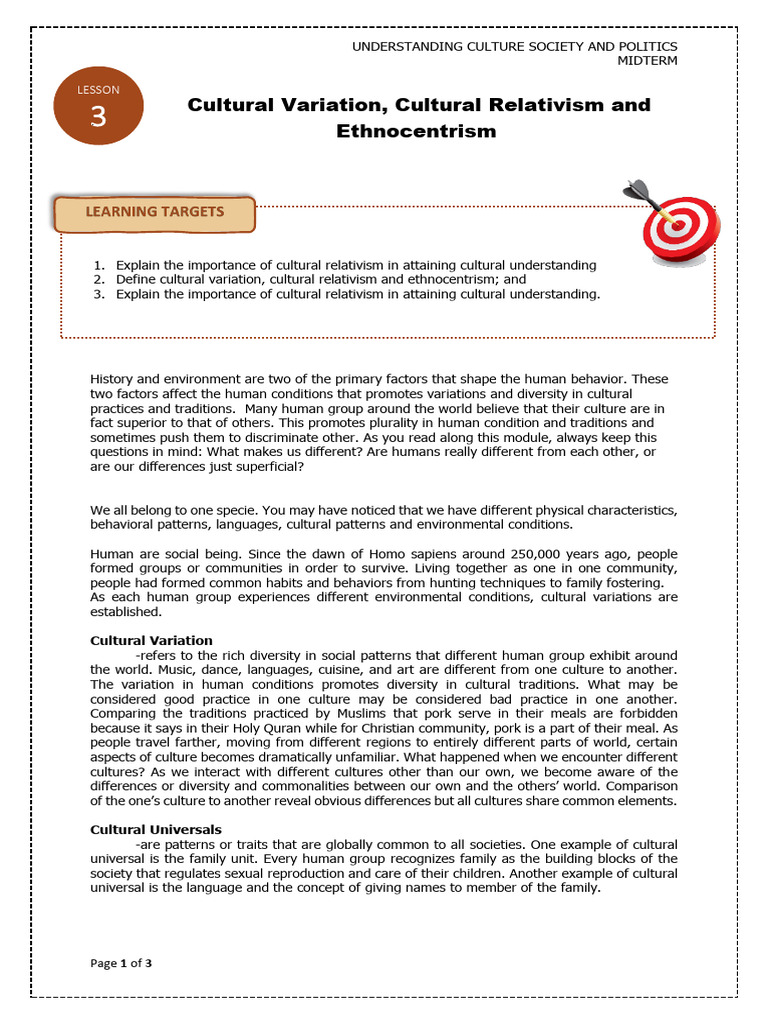Cultural relativism, the doctrine positing that a person’s beliefs and values should be understood based on that individual’s own culture, has become an influential paradigm in contemporary discourse. While the notion promotes an appreciation for diversity and fosters an atmosphere of understanding, it also engenders a multifaceted threat to societal cohesion and ethical consensus. Can we allow cultural practices that are unequivocally detrimental to humanity and the environment simply because they are entrenched in tradition?
At its core, cultural relativism encourages us to recognize that no culture is superior to another. This perspective, while noble in intent, can lead to a dilution of universal human rights standards. For instance, practices like child marriage or female circumcision may be defended under the guise of cultural tradition. How do we reconcile these with our evolving concepts of individual rights and freedoms? The juxtaposition of cultural fidelity against the imperative of human rights creates a moral quagmire.
Additionally, cultural relativism can inhibit critical discourse around pressing global issues. When societies adopt an overly permissive attitude towards cultural practices, they risk perpetuating harmful traditions that may defy social progress. Consider the environment: some cultures may engage in practices that contribute to ecological degradation. Should such practices be shielded from critique due to cultural sensitivity? Ignoring the environmental consequences of certain cultural rites can lead to irreversible damage to our planet.
Moreover, the relativistic stance can generate xenophobia. As society evolves, cultural exchanges become inevitable. However, when individuals view their own culture as inherently superior, they may see foreign customs as threats. This mindset fosters an atmosphere of hostility towards outsiders, undermining the essential fabric of multiculturalism. The resultant societal polarization complicates the pursuit of global issues, such as climate change, where collective action and cooperation across cultural lines become indispensable.
Let’s pose a playful yet cautionary question: is cultural relativism akin to a double-edged sword? On one side, it shields against ethnocentrism and promotes understanding; on the other side, it can render societies complacent in the face of injustice. When difficult conversations about culture arise, the comfort of cultural relativism may deter individuals from confronting uncomfortable truths about their practices. Without such discussions, harmful societal norms may persist unchallenged.
A further complication involves the stark reality of cultural imperialism. In an increasingly globalized world, dominant cultures often impose their values on others, leading to the marginalization of lesser-known traditions. Cultural relativism can serve as a countermeasure to this trend by validating diverse practices. Still, this validation must not come at the cost of overlooking ethical considerations. The challenge lies in finding a balance: how do we honor cultural diversity while simultaneously advocating for universal human rights and environmental stewardship?
The ethical framework of cultural relativism invites complexities that demand nuanced responses. It proffers an essential critique of Western-centric views, yet it also necessitates the development of a global ethos that transcends local cultural narratives. For instance, consider climate change, an issue that transcends geographical and cultural boundaries. While local traditions may dictate resource usage or land management practices, there exists a compelling argument for a collective responsibility to embrace sustainable practices. This call to action cannot be overshadowed by cultural defenses.
Perhaps the crux of the challenge lies in education. To navigate the intricacies of cultural relativism, societies must engage in critical dialogues and emphasize cultural literacy. By fostering environments that encourage individuals to question both their cultural traditions and those of others, a more robust understanding of the planetary plight can emerge. The cultivation of a critical consciousness paves the way for informed decisions that can harmonize cultural reverence with ethical considerations.
Moreover, technology can play an instrumental role in bridging cultural divides. In our interconnected world, digital platforms enable the exchange of ideas across cultural landscapes. Harnessing this potential can facilitate dialogues around urgent issues, fostering collective efforts toward sustainable practices. Through collaborative initiatives, diverse cultural perspectives can converge, inspiring innovative solutions to common challenges.
Nonetheless, cultural relativism poses a pivotal conundrum for contemporary society. It generates a paradox where goodwill towards cultural understanding can inadvertently enable harmful practices to persist. Striking a balance demands vigilance and a relentless pursuit of ethical clarity. The prospect of cultural preservation must coexist with an unwavering commitment to universal human rights and environmental sustainability.
Thus, as we navigate the labyrinth of cultural diversity, it is essential to ask ourselves: can the manifestations of cultural relativism be so unyielding that they obscure the broader implications of humanity’s actions? In a world already fraught with challenges—climate change being a paramount concern—embracing a responsive stance towards cultural practices is not merely a philosophical endeavor; it is an urgent call to action. To protect the future of our planet and foster equitable societies, the time has come to re-evaluate how we approach cultural relativism in the light of universal accountability.
